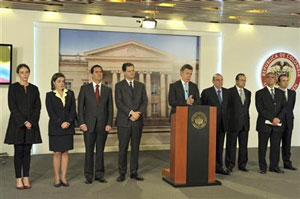06 Sep 2012 - {{hitsCtrl.values.hits}}
 Colombian President Juan Manuel Santos unveiled on Wednesday a six-man team to negotiate with Marxist FARC rebels in the hope of ending almost 50 years of war.
Colombian President Juan Manuel Santos unveiled on Wednesday a six-man team to negotiate with Marxist FARC rebels in the hope of ending almost 50 years of war.
18 Nov 2024 4 hours ago
18 Nov 2024 4 hours ago
18 Nov 2024 4 hours ago
18 Nov 2024 4 hours ago
18 Nov 2024 4 hours ago